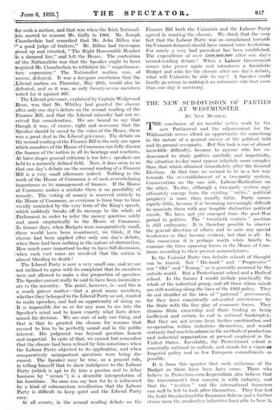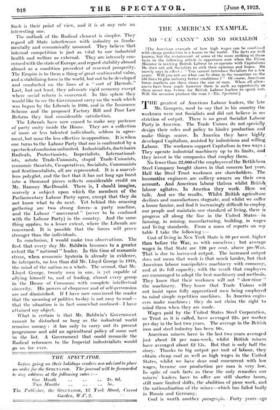THE NEW SUB-DIVISION OF PARTIES AT WESTMINSTER
By NEW MEMBER. THE conclusion of six months' active work by the new Parliament and the adjournment for the Whitsuntide recess afford an opportunity for something in the nature of a general survey of the political field and its present occupants. But this task is one of almost incredible difficulty, because to anyone who has en- deavoured to study politics carefully and impartially, the situation to-day must appear infinitely more complex than that which obtained immediately after the General Election. At that time we seemed to be in a fair way towards the re-establishment of a two-party system, Conservatism on the one side, Labour-Radicalism on the other. To-day, although a two-party system may ultimately emerge from the existing " melee," politiCal prophecy is more than usually futile. Party names signify little, because it is becoming increasingly difficult to associate them with any tangible distinctive political creeds. We have not yet emerged from the post-War period in politics. The " twentieth century " position is still embryonic. It is therefore possible to observe the general direction of affairs and to note any special tendencies as they become evident, but that is all. In this connexion it is perhaps worth while briefly to examine the three opposing forces in the House of Com- mons according to their present nomenclatures.
In the Unionist Party two definite schools of thought can be traced. Not " Die-hard " and " Progressive " nor "Old" and "Young," as is generally assumed by the outside world. But a Protectionist school and a Radical school. In the former I would include practically the whole of the industrial group, and all those whose minds are still working along the lines of the 1923 policy. They do not shudder at the idea of " paternal " government, for they have consistently advocated interference by the State with the free play of economic forces. They dismiss State ownership and State trading as being inefficient and certain to end in national bankruptcy. But they are not averse from further combination and co-operation within industries themselves, and would certainly find much to admire in the methods of production and industrial organization at present employed in the United States. Inevitably, the Protectionist school is essentially national in outlook, and stands for a vigorcus Imperial policy and as few European commitments as possible.
It is from this quarter that such criticisms of the Budget as there have been have come. Those who believe in Protection-cum-Imperialism also believe that the Government's first concern is with industry, and that the " rentiers " and the international financiers can well be left to look after themselves. They fear lest the Gold Standard and the Insurance Scheme put a further strain upon the productive industries least able to bear it. Such is their point of view, and it is at any rate an interesting one.
The outlook' of the Radical element is simpler. They regard all State interference with industry as funda- mentally and economically unsound. They believe that internal competition is just as vital to our industrial health and welfare as external. They are intensely con- cerned with the state of Europe, and regard stability abroad almost as a condition precedent of renewed prosperity. The Empire is to them a thing of great sentimental value, and a stabilizing force in the world, but not to be developed and conducted on the lines of a " sort of Harrods." Last, but not least, they advocate rigid economy except where social reform is concerned. In this sphere they would like to see the Government carry on the work which was begun by the Liberals in 1906, and in the Insurance Scheme and the proposed Factory Bill and Poor Law Reform they find considerable satisfaction.
• The Liberals have now ceased to make any pretence of party unity inside the House. They are a collection of more or less talented individuals, seldom in agree- ment, but none the less effective in opposition. It is when one turns to the Labour Party that one is confronted by a spectacle of confusion unlimited. Industrialists, doctrinaire Radicals, Protectionists, Imperialists, International- ists, astute Trade-Unionists, stupid Trade-Unionists, economic theorists, Co-operatives, Socialists, Communists and Sentimentalists, all are represented. It is a marvel- lous polyglot, and the fact that it has not long ago burst into a thousand pieces reflects considerable cm edit on Mr. Ramsay MacDonald. There is, I should imagine, scarcely a subject upon which the members of the Parliamentary Labour Party agree, except that they do not know what to do next. Yet behind this amazing gathering are two strong forces—a party machine, and the Labour " movement " (never to be confused with the Labour Party) in the country. And the same thing applies, to a lesser extent, where the Liberals are concerned. It is possible that the forces will prove stronger than the individuals.
• In conclusion, I would make two observations. The first that every day Mr. Baldwin becomes to a greater extent the " national " leader. In this time of economic stress, when economic hysteria is already in evidence, he interprets, no less than did Mr. Lloyd George in 1918, the mind of the nation as a whole. The second, that Mr. Lloyd George, twenty men in one, is yet capable of allying himself to, and of leading, almost every group in the House of Commons with complete intellectual sincerity. His powers of eloquence and of self-persuasion are not diminished: If I have now convinced the reader that the meaning of politics to-day is not easy to read that the situation is in fact somewhat confused—I have attained my object.
What is certain is that Mr. Baldwin's Government cannot be disturbed so long as the industrial world remains uneasy : it has only to carry out its present programme and add an' agricultural policy of some sort to the list. A Government that could reconcile the Radical reformers to the Imperial industrialists would go on for ever. • •















































 Previous page
Previous page